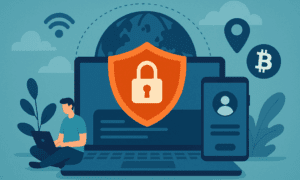With the ever-changing digital landscape, it’s important to keep your data safe and secure. One of the best ways to do this is by using a Virtual Private Network (VPN). In this article, we’ll discuss what vpn are, why you should use them, and how to get started with free VPN services. Get ready to learn everything you need to know about protecting your online privacy!
What is a Virtual Private Network (VPN)?
A VPN is a private network that uses a public network (usually the Internet) to connect remote sites or users together. The VPN uses “virtual” connections routed through the Internet from the business’s private network to the remote site or employee. By using a VPN, businesses ensure security — anyone intercepting the encrypted data cannot read it.
VPNs were originally used by businesses to allow their employees to securely access their internal network from remote locations. Today, VPNs are increasingly being used by individuals for personal use. For example, when traveling, you can use a VPN to connect to your home network and access your files, email, and other resources as if you were actually at home. Or, you can connect to a VPN server in another country to access content that might be blocked in your own country.
There are two primary types of VPNs: site-to-site and client-to-site. Site-to-site VPNs connect entire networks together so that all of the devices on both networks can communicate with each other. Client-to-site VPNs, on the other hand, connect individual devices to aVPN server so that those devices can communicate with other devices on the network as if they were on the same local network.
Benefits of Using a VPN
A VPN, or Virtual Private Network, allows you to create a secure connection to another network over the Internet. VPNs can be used to access region-restricted websites, shield your browsing activity from prying eyes on public Wi-Fi, and more.
We’ve compiled a list of the biggest benefits of using a VPN so that you can decide if a VPN is right for you.
- Access Region-Restricted Content
One of the most common reasons people use a VPN is to access content that is blocked in their country. For example, if you’re an American traveling abroad, you may want to connect to a US-based VPN server to access Netflix or Hulu. Similarly, if you’re in a country like China or Iran where internet freedom is restricted, you can use a VPN to bypass government censorship and access the internet freely.
- Enhance Your Privacy and Security Online
When you connect to the internet without a VPN, your data is exposed to potential threats like hackers and snoopers. But when you use a VPN, your traffic is encrypted and routed through a secure tunnel, making it much harder for anyone to steal your data or spy on your online activity. This is especially important when using public Wi-Fi networks which are often unsecured.
Types of VPN Services
A Virtual Private Network (VPN) is a private network that uses a public network, such as the Internet, to connect remote sites or users together. VPNs use a variety of security protocols and encryption algorithms to ensure that data is securely transmitted between the VPN server and client.
There are two main types of VPN services: site-to-site and point-to-point. Site-to-site VPNs connect two or more remote sites together over the Internet, using a secure tunneling protocol to encrypt data traffic. Point-to-point VPNs connect individual clients to a remote site over the Internet, using an encrypted tunneling protocol.
Most VPN services offer both site-to-site and point-to-point connectivity. Some providers also offer hybrid VPNs, which combine features of both site-to-site and point-to-point VPNs.
How to Set Up a VPN
A VPN, or Virtual Private Network, is a secure tunnel between two or more devices. VPNs are used to protect private web traffic from snooping, interference, and censorship. A VPN encrypts your internet connection and routes it through a remote server, hiding your activity from your ISP and government.
There are many reasons to use a VPN, including:
-To keep your online activity private from your ISP and government
-To circumvent censorship and access blocked websites
-To improve online security and protect yourself from hackers
-To stream regionally restricted content like Netflix and BBC iPlayer
If you’re looking for a VPN provider, we recommend ExpressVPN. They offer a fast, reliable service with strong encryption and 24/7 customer support. However, there are many other reputable providers out there to choose from.
Setting up a VPN is simple. Just follow these steps:
1) Choose a VPN provider. We recommend ExpressVPN, but there are many others to choose from. Simply sign up for an account with your chosen provider.
2) Download and install the VPN software on your device(s). This software will allow you to connect to the VPN server.
3) Connect to the VPN server. You will be prompted to enter your username and password (provided by your VPN provider). Once you’re connected, all of your internet traffic will be routed through the encrypted tunnel.
Keeping Your Data Secure with a VPN
A VPN, or Virtual Private Network, is a tool that allows you to securely connect to another network over the internet. A VPN can be used to access region-locked content, like Netflix US from outside the US, or to bypass government censorship and firewalls.
VPNs work by routing your internet traffic through an encrypted tunnel between your device and the VPN server. This makes it impossible for anyone on the same network as you to snoop on your traffic or see what websites you’re visiting.
There are many different types of VPNs available, but not all of them are created equal. Some free vpn may sell your data or show you annoying ads. That’s why it’s important to choose a reputable VPN service like ExpressVPN that has a strict no-logging policy and doesn’t track your activity.
If you’re looking for a reliable and affordable VPN service, we recommend ExpressVPN. They offer a 30-day money-back guarantee so you can try it risk-free.
Pros and Cons of Using Free VPNs
There are a lot of reasons why you might want to use a VPN, and there are a lot of different types of VPNs to choose from. But what is a free VPN, and should you use one?
A free VPN is a Virtual Private Network that allows you to connect to the internet without having to pay for a subscription. There are many free VPNs available, and they can be a great option if you just need occasional access to a VPN or if you want to try out a new service.
However, there are also some potential downsides to using a free VPN. First, free VPNs often have fewer servers than paid ones, which can mean slower speeds and more connection issues. Second, free VPNs may collect data about your usage habits and sell it to third parties, which could compromise your privacy. Finally, some free VPNs may contain malware or other malicious software that could harm your device.
If you’re considering using a free VPN, be sure to research it thoroughly first to make sure it’s reputable and safe. And remember that even the best freeVPN has its limitations – so if you need reliability and speed, it’s worth paying for a premium VPN service.
Alternatives to Using a VPN
If you’re looking for alternatives to using a VPN, there are a few options available. One is to use a proxy server, which will route your traffic through a different IP address. This can be effective in some cases, but it’s not as secure as a VPN. Another option is to use a web-based anonymizer, which will mask your IP address and make it harder for websites to track your activity. However, these services are often not as reliable as a VPN.
Conclusion
Virtual Private Networks are becoming increasingly popular and for good reason. They provide users with a secure way to access the internet, as well as providing added privacy benefits when streaming content or downloading files. VPNs can also be used to bypass geographic restrictions, so that you can access websites from around the world without having to worry about censorship or other limitations. Whether you’re looking for an affordable free VPN or a more advanced paid service, there is something out there for everyone and we hope this article has helped you make a better decision on which one is right for you.



































